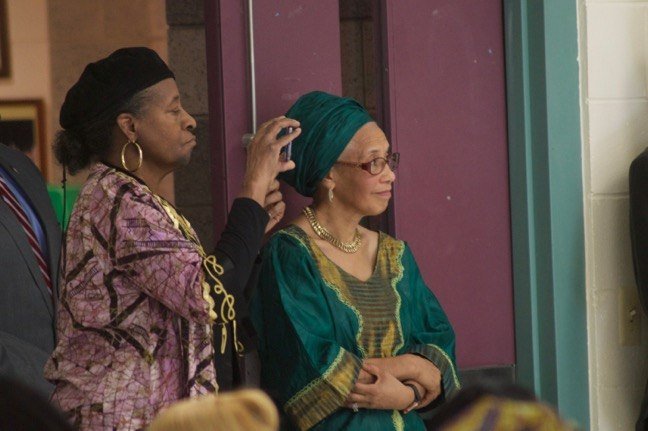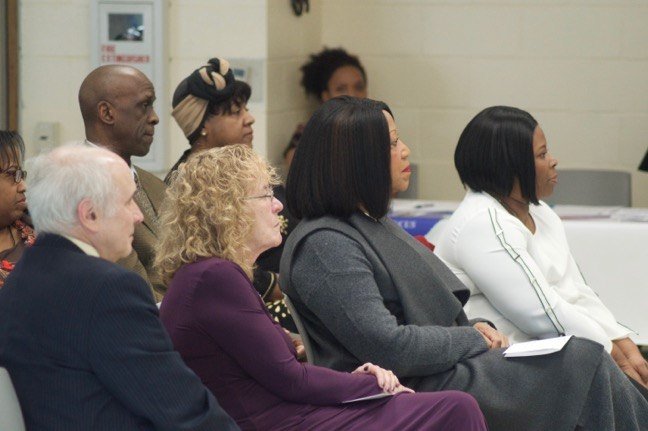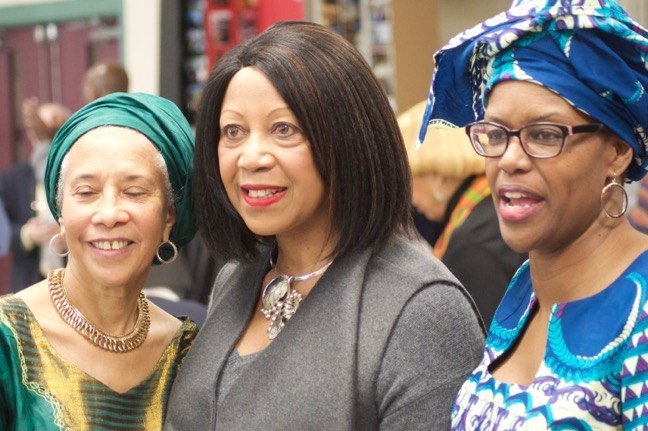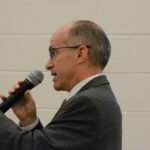Democratic Black Caucus Celebrates Black History Month With Speakers, Exhibitions
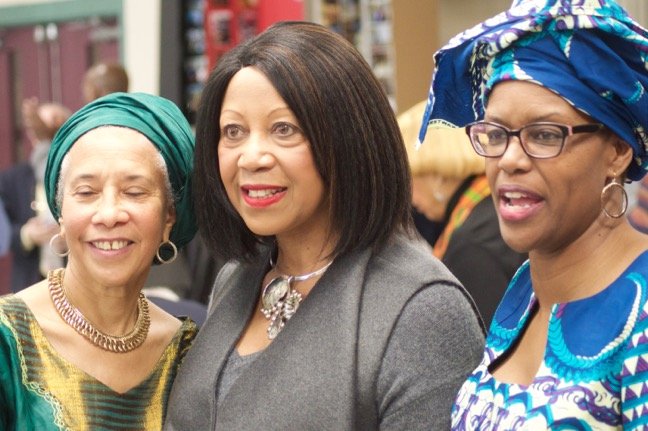
Tina Jalloh, president of the Somerset County Democratic Black Caucus, Secretary of State Sheila Oliver and Somerset County Freeholder Shanel Robinson, left to right, at the Black Caucus’s Black History Month celebration.
Exhibitions of black culture, calls for continued social justice activism and an appearance by the state’s Lieutenant Governor highlighted the annual Black History Month celebration Feb. 16 at the township Community/Senior Center.
Sponsored by the Somerset County Democratic Black Caucus, the day also featured a number of speakers, including state Lieutenant Governor Sheila Oliver, Mayor Phil Kramer, Somerset County Freeholder Shanel Robinson and the event’s keynote speaker, Larry Hamm, chair of the Newark-based People’s Organization for Progress.
Additionally, there were musical performances by Sidiki Jabeteh’s Grio Band and vocalists Jasmine Marcial and Andrea Tatum, dance by Bearean Youth Ministries dance troupe, an inspirational rap performance by Andrea Tatum, Kyle Walker and Courtney Walker, poetry by Anissa Jean-Pierre and Joseph Thomas and oratory by Kayla Hill.
Some of the speakers celebrated Robinson, who is the first African-American to be elected to the county Freeholder board.
Oliver, who is the state’s second Lieutenant Governor and the first African-American in the position, said she wanted to attend the event because while she visits communities across the state, “I also recognize that there is a very active and organized black community in Franklin Township. I’ve been for years a friend and colleague of Rev. Buster Soaries and he has certainly done a lot to influence the leadership of Somerset County.”
“I have a lot of friends and people I’ve worked with through the years who come from Franklin,” she said.
Soaries is the pastor of First Baptist Church of Lincoln Gardens, and a former state Secretary of State under Gov. Christine Whitman.
In her remarks, Oliver told the more than 100 attendees about 2019 being the 400th anniversary of when Africans were first brought to Virginia, about the importance of black organizations which “for a very long time formed the backbone of leadership in communities of color throughout the country,” and about the state’s Amistad Act, the 2002 legislation which mandates that black history be included in public schools’ social studies curricula.
Kramer was one of those who noted Robinson’s historic victory.
“I spent the summer and fall campaigning with Shanel, going door to door,” he said. “Campaigning is hard. You meet people and you hear their ideas and you hear what they care about, taxes, and the next thing they care about is the education of their children.”
“When you’re walking with Shanel … you know you’re doing the right thing,” he said. “You know that it is important that she gets elected.”
Kramer also pointed out a part of Franklin history not generally spoken about: a major rally of the Ku Klux Klan in May 1923 on a Middlebush farm not far from the current municipal complex.
“Just under 100 years ago, there was a Ku Klux Klan rally of 12,000 people, and they inducted almost 1,000 additional people there,” he said. “They burned a cross that was 60 feet high. And a man stood up to them, a man paced back and forth … he kept saying, I have a right to be here.”
“That African-American stood up in a peaceful manner,” Kramer said. “Unfortunately, his name is lost in history, but we need to learn more about him and more about what happened that night and we should never forget what happened in this town, and other things that happened in this country. Because when we make that mistake, then we do not learn from it and we do not grow from it.”
Peg Schaffer, chairwoman of the Somerset County Democrats, credited the black caucus with the Democrats’ historic win in the 2018 elections.
“Somerset County Black Caucus, you are the Democratic Party in Somerset County,” she said. “I can’t thank you enough for what you do. You shared Shanel Robinson with us, and as a result we have the first-ever black elected county freeholder in Somerset County.”
“We also have the most diverse freeholder board now, we have three women and we also have the first Hispanic woman,” Schaffer said.
“Shanel won the election last year by 10,000 votes, and most of those votes came right out of this township and this audience, and I want to thank you again,” she said.
State Assemblywoman Linda Carter (D-22) told the crowd that of the importance of teaching about black history.
“There’s been so many injustices in our lives, and we continue to fight for what our ancestors fought for us to be here,” she said. “We have to make sure that we have venues like this that we know our history and we are able to move forward. And we have to be able to collaborate together.”
“We were not listened to many years ago, we were not listened to 20, 30, 40 years ago,” she said. “But as we continue to come together and as we continue to make sure our voices are heard, and our history is known, we will make sure that we start to close that gap and we start to remedy some of the injustices that have gone before us.”
Hamm, the keynote speaker, talked about the history of black people in the United States, and about the creation of Black History Month.
“I stand here in the 21st Century, proud to be a black person in the United States of America,” he said.
“There was a time when there was no black history month,” he said. “There was a time when some of us in this room were students in high school who led walkouts demanding black studies … may have been members of black student unions on college campuses that had no black history courses, marched, protested and sat in to force these colleges and universities to establish these black history programs.”
“Nobody gave us black history month, we had to fight for black history month,” Hamm said.
“You cannot tell the story of humanity without telling the story of black people,” Hamm said. “Because humanity originates in Africa. The oldest archeological anthropological evidence of mankind comes out of East Africa.”
Referring to the resurgence of hate groups since the election of President Donald Trump, Hamm said, “I’m 65 years old, and I’ve seen nine presidents in the United States, I’ve never seen anything like this before. Never.”
“And they are trying to roll back every right, every program that we struggled for for the last 75 years,” he said. “I don’t know about you, I’m not going back without a fight. I’m fighting for every inch, every inch of social progress. Every inch.”

































